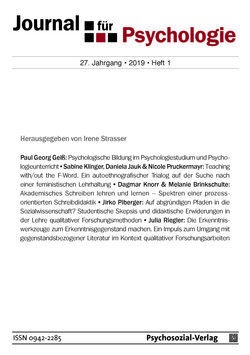21 Seiten, PDF-E-Book
Erschienen: Oktober 2019
Bestell-Nr.: 34022
https://doi.org/10.30820/0942-2285-2019-1-51
abonnieren
Dagmar Knorr
Akademisches Schreiben lehren und lernen - Spektren einer prozessorientierten Schreibdidaktik (PDF)
Journal für Psychologie 1, 2019, 51-71
Sofortdownload
Dies ist ein E-Book. Unsere E-Books sind mit einem personalisierten Wasserzeichen versehen,
jedoch frei von weiteren technischen Schutzmaßnahmen (»DRM«).
Erfahren Sie hier mehr zu den Datei-Formaten.
Von Studierenden wird erwartet, dass sie akademische Texte verfassen können, die fachlichen und sprachlichen Anforderungen gerecht werden. Der Umgang mit fachlichen und textuellen Konventionen sowie das Schreibhandeln der Studierenden sind wichtige Bestandteile der Arbeit von Schreibzentren. Gemeinsam mit Lehrenden werden Anforderungen an Texte herausgearbeitet. Zudem werden die Anforderungen an Texte untersucht, die Lehrende an Texte stellen. Denn je besser fachliche und sprachliche Anforderungen an Texte beschrieben werden können, desto eher können diese vermittelt werden. Schreiben im Studium wird in drei Dimensionen beschrieben: das Nutzen des Schreibens für das kritische Denken, die produktive Steuerung des eigenen Schreibprozesses sowie die Kenntnis von Textkonventionen zur angemessenen sprachlichen Realisierung. Anhand von Beispielen wird gezeigt, wie die Arbeit von Schreibzentren sowohl fachübergreifend als auch in den Fächern selbst gestaltet werden kann. Die Kooperation mit Fachlehrenden ist ein wichtiger Baustein. Hinzu kommt die Arbeit mit Studierenden und die Ausbildung von Studierenden zu studentischen Schreibberater_innen und Writing Fellows. Es wird gezeigt, wie hieraus Nutzen für die gesamte Hochschule entstehen kann. Abschließend wird die derzeitige Stellung von Schreibzentren in der Hochschullandschaft kritisch beleuchtet.
Abstract:
Instructors expect students to submit academic texts that do not contain any traces of the writing process and that conform to disciplinary and stylistic conventions. These conventions and the practices of student writers are at the core of writing center work. We work closely with faculty staff to understand professors’ expectations concerning student work in particular and academic writing in general. The results of this collaborative effort can be used to improve the quality of instruction in and outside of the classroom, to develop new instructional formats, or to provide high-quality feedback on disciplinary writing. Here, we discuss three dimensions of this kind of writing: writing as a means to develop critical thinking and facilitate active learning; an understanding of writing processes and the ability to design the processes; and an understanding of conventions and the ability to apply this kind of knowledge. Discussing several successful approaches taken at German writing centers, we show that it is possible to work both across and within disciplines. Key elements are a close cooperation with faculty, individual consultations and workshops and peer tutor and writing fellows programs. All of these programs can, we suggest, be beneficial to universities. We conclude by discussing the potential contributions of writing centers to higher education.
Abstract:
Instructors expect students to submit academic texts that do not contain any traces of the writing process and that conform to disciplinary and stylistic conventions. These conventions and the practices of student writers are at the core of writing center work. We work closely with faculty staff to understand professors’ expectations concerning student work in particular and academic writing in general. The results of this collaborative effort can be used to improve the quality of instruction in and outside of the classroom, to develop new instructional formats, or to provide high-quality feedback on disciplinary writing. Here, we discuss three dimensions of this kind of writing: writing as a means to develop critical thinking and facilitate active learning; an understanding of writing processes and the ability to design the processes; and an understanding of conventions and the ability to apply this kind of knowledge. Discussing several successful approaches taken at German writing centers, we show that it is possible to work both across and within disciplines. Key elements are a close cooperation with faculty, individual consultations and workshops and peer tutor and writing fellows programs. All of these programs can, we suggest, be beneficial to universities. We conclude by discussing the potential contributions of writing centers to higher education.
Paul Georg GeißS. 3–29Psychologische Bildung im Psychologiestudium und Psychologieunterricht (PDF)
Journal für Psychologie 1, 2019, 3-29Sabine Klinger, Daniela Jauk & Nicole Pruckermayr S. 30–50Teaching with/out the F-Word. Ein autoethnografischer Trialog auf der Suche nach einer feministischen Lehrhaltung (PDF)
Journal für Psychologie 1, 2019, 30-50Dagmar KnorrS. 51–71Akademisches Schreiben lehren und lernen - Spektren einer prozessorientierten Schreibdidaktik (PDF)
Journal für Psychologie 1, 2019, 51-71Jirko PibergerS. 72–97Auf abgründigen Pfaden in die Sozialwissenschaft?. Studentische Skepsis und didaktische Erwiderungen in der Lehre qualitativer Forschungsmethoden (PDF)
Journal für Psychologie 1, 2019, 72-97Julia RieglerS. 98–122Die Erkenntniswerkzeuge zum Erkenntnisgegenstand machen. Ein Impuls zum Umgang mit gegenstandsbezogener Literatur im Kontext qualitativer Forschungsarbeiten (PDF)
Journal für Psychologie 1, 2019, 98-122
Journal für Psychologie 1, 2019, 3-29Sabine Klinger, Daniela Jauk & Nicole Pruckermayr S. 30–50Teaching with/out the F-Word. Ein autoethnografischer Trialog auf der Suche nach einer feministischen Lehrhaltung (PDF)
Journal für Psychologie 1, 2019, 30-50Dagmar KnorrS. 51–71Akademisches Schreiben lehren und lernen - Spektren einer prozessorientierten Schreibdidaktik (PDF)
Journal für Psychologie 1, 2019, 51-71Jirko PibergerS. 72–97Auf abgründigen Pfaden in die Sozialwissenschaft?. Studentische Skepsis und didaktische Erwiderungen in der Lehre qualitativer Forschungsmethoden (PDF)
Journal für Psychologie 1, 2019, 72-97Julia RieglerS. 98–122Die Erkenntniswerkzeuge zum Erkenntnisgegenstand machen. Ein Impuls zum Umgang mit gegenstandsbezogener Literatur im Kontext qualitativer Forschungsarbeiten (PDF)
Journal für Psychologie 1, 2019, 98-122

